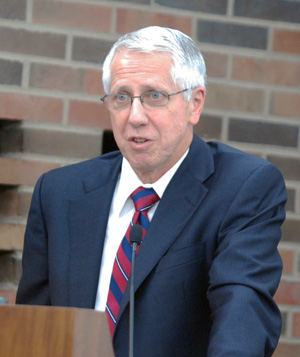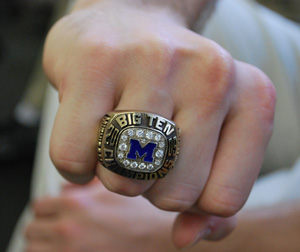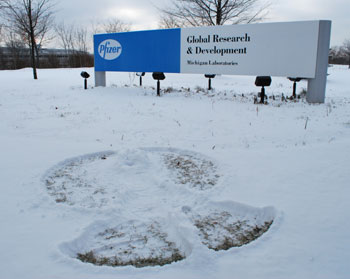University of Michigan board of regents meeting (July 21, 2011): Ten years after the 2001 board of regents authorized its formation, the UM Depression Center has become a national leader in breaking the stigma and improving the treatment of this common, debilitating illness.

John Greden, director of the University of Michigan Depression Center, briefed regents at their July 21, 2011 board meeting. (Photos by the writer.)
That message was delivered by the center’s director, John Greden – the man whose vision was instrumental in creating it a decade ago. Greden briefed regents on the center’s progress so far, describing its research and outreach efforts, including its leadership in developing a national network of depression centers that he said is strengthening the fight against the illness. He also indicated the center will be launching a fundraising campaign in the near future, to raise more resources in the face of overwhelming demand for services.
In addition to Greden’s report, regents voted on a range of items. The most significant in terms of a financial commitment was approval of a $116 million “deep” renovation of East Quad, a large dorm on East University Avenue. It’s also the home to UM’s Residential College. At the board’s May 19, 2011 meeting, philosophy professor Carl Cohen had raised concerns about the impact of the renovations as initially designed, saying the RC would be pushed into smaller, inadequate space and would “atrophy and fade away.” A schematic design hasn’t yet been presented to the board for approval.
Among other actions, regents also approved a new joint master’s degree program in entrepreneurship to be offered by the College of Engineering and the Ross School of Business. They authorized renaming the department of geological sciences – it will be called the department of earth and environmental sciences. Regents also approved a $698,364 purchase of land at 417 S. Division, next to the UM Institute for Social Research. Within the past year, that’s the third property – all with apartment buildings – that the university has bought to accommodate ISR’s expansion project. Regents approved that project last year.
In the context of board committee assignments, regent Martin Taylor alerted his colleagues that he’d talked with the university’s general counsel about possible conflict of interest issues that might arise for him in the future. The board’s health affairs committee will likely be involving all regents in overseeing a strategic plan for the UM health system – Martin also serves as a director of Blue Cross Blue Shield of Michigan.
Only one person spoke during public commentary. Dan Benefiel, a leader of the Willow Run Tea Party Caucus, sharply criticized the university’s support of globalism and its relationship with China, a country that he accused of stealing intellectual property and trade secrets from the U.S. The “Trojan Horse of China” must be stopped from “unleashing its unsavory minions” on America, he said. [Full Story]






